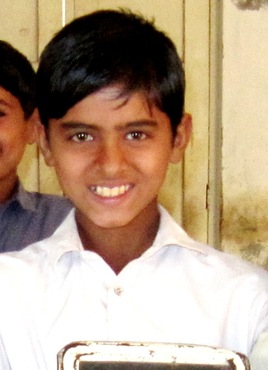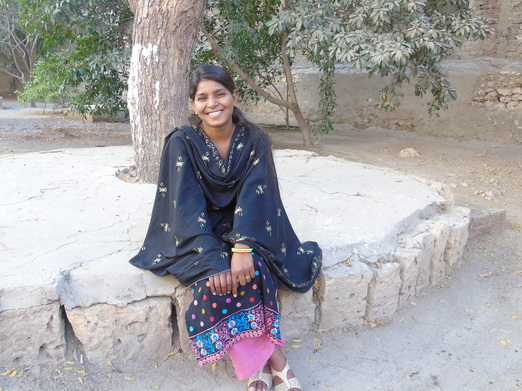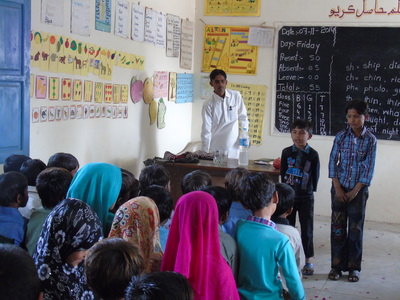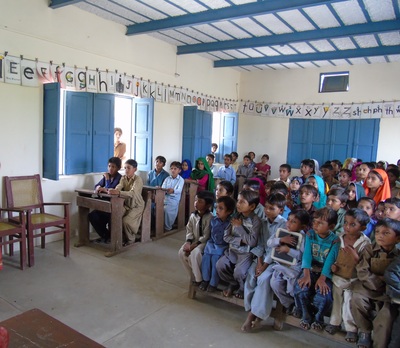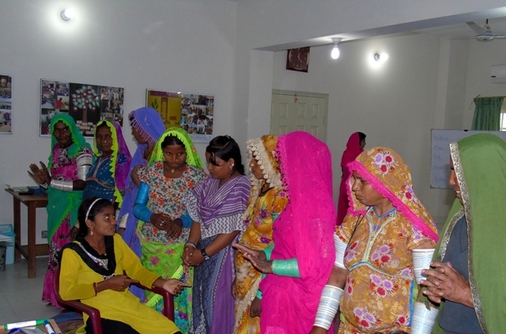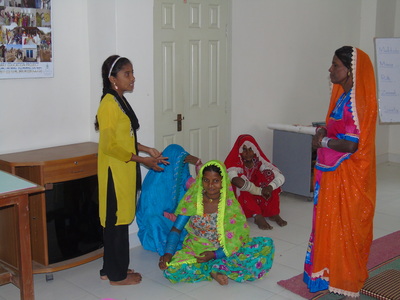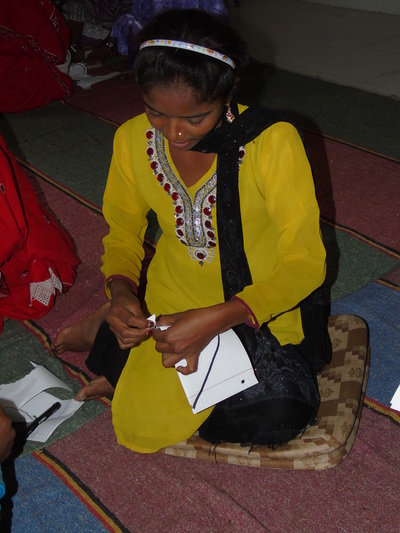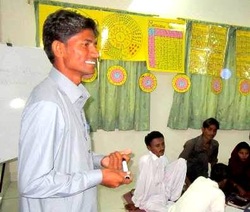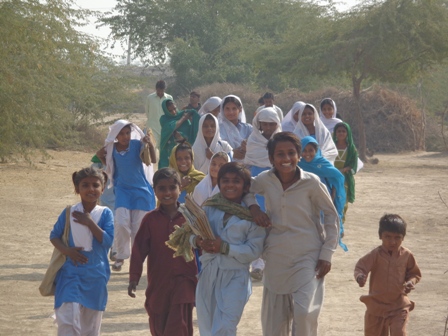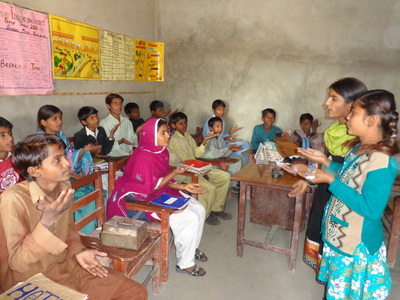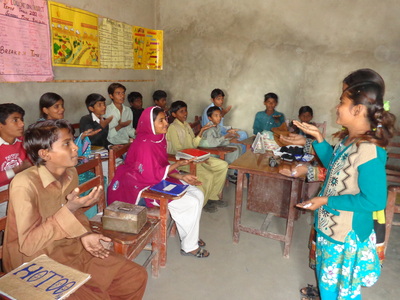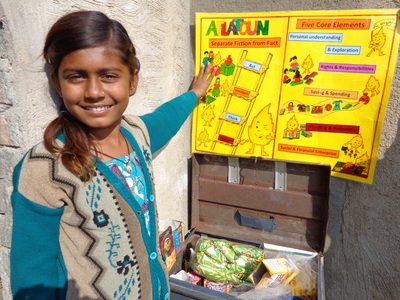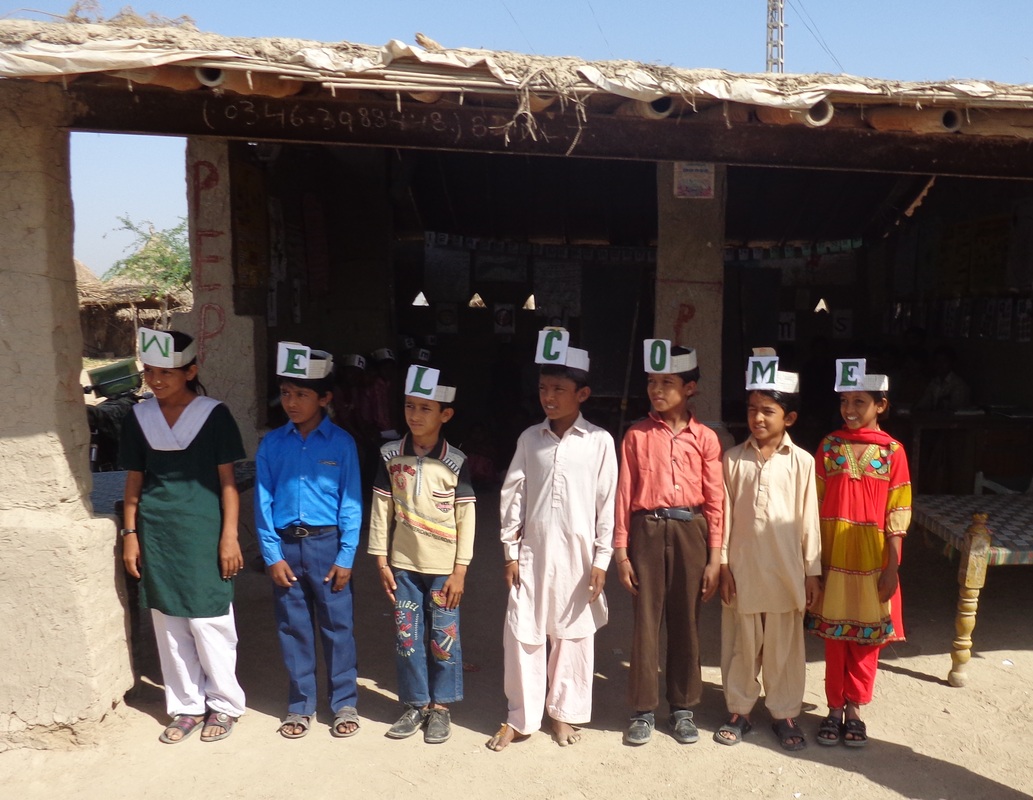|
I was always very fond of going to school, but we had no school in our village and my parents didn't have enough expenses to send me to a government school, so I didn't go to a school. At that time I was quite small, but I used to work in the fields with my father. Once while working in the fields, my father asked me if I wanted to study, and I shyly smiled. My father knew my answer. He then told about the new PEP school that had been opened in our village and many children were getting enrolled. At that moment I felt like the luckiest child on earth.
At that time I was enrolled as a first grader, but now I study in class five. I love the environment of my school because I can make many friends and our teacher is always very kind to us. I have learned about many important issues in my school that have encouraged me to think broadly. I learned about the importance of girls' education, and about health and sanitation. I have also learned how to save and spend money through the financial education (Aflatoun) program, and now I have started to have my own savings, which helps me to cover a lot my expenses on my own. I have increased my language skills through the letter land Training at PEP. Through this training, I have gained much confidence in speaking and writing English. After my school, I help my father in the fields because my father is a farmer. During the work hours in fields, I have the chance of telling him about my day in school. He looks very proud of me and he always encourages me to do best in school. I believe that through learning in school, I have experienced a good change in my personality and my behavior. I wish to become a teacher in future because I want to educate the poor children and work as a change agent for my community. Coming to school makes me happy because I have many friends and we share our time through studying and playing together. I am especially very happy to have a new building in my school, because more poor children will have the chance to learn in a school.
0 Comments
"Once a health worker came to our village and gave us a presentation about how to have a clean environment. I kept looking at the way that lady spoke and I thought, gosh, I wish I could speak like that in front of a crowd as this. Well, God definitely heard me."
Parsan developed her confidence through the WEG trainings at PEP. She was always very enthusiastic about communicating with people, and her enthusiasm led her to become one of the great leaders of the Women's Empowerment Program. She takes charge with great courage and reaches out to the women who need counseling and motivation about education. Working among the Women's Empowerment Group has affected Parsan's life in a very positive way. She has understood lots of problems that women face because of being uneducated. She has also realized that every problem does have a solution, and because of that Parsan is determined to help other ladies to understand that. She feels honored to be contributing in changing the thoughts of women about educating girls, and always wants to give them a challenge to win. She loves to see new WEG groups being formed and the enrollment of girls being increased day by day. All these achievements give Parsan the hope that what she does for the women will never go in vain, and that a great harvest can be reaped through spreading the light of education. Parsan believes that the WEG training helps women to understand how to live a healthy and an effective life for themselves and for their family. She works as the WEG Area Coordinator for her village and trains other women to become WEG facilitators for their communities. PEP has been working to provide quality education to Bharu Thakur community since 2005. The landlord of this community shared that, he and his extended family had come from India 32 years ago and this was the first time his community had received any support since arrival in Pakistan. When the floods in 2006 had destroyed the village school, the landlord with the help of PEP took efforts in rebuilding the school in a hut. The Bharu Thakur community was very determined to keep continuing the education of the children.
For many years, this school had proved to be deeply rooted in education, and therefore PEP was delighted to open a new school building in their village. Bharu Thakur community were given a new school building in June 2014. The teacher, children and parents are happy to have a permanent building which is very light and airy and gives the message to all visitors that the community has achieved a sustainable school. The teacher Baboo, has given his tireless efforts in teaching the children and committing himself to the purpose of providing sustainable future for his community. Baboo recognizes the many changes that have happened in his own life through the teacher training that he has received and he has a strong vision for the school “My aim is to double the enrollment so that my younger brother can also become a teacher here.” Today Baboo is very happy to have a secure foundation for the children in his school. PEP aims to provide more specialized training to teachers like Baboo and hopes to establish effective leaders for their communities. "I was determined to study, because I wanted to learn to speak for my rights." Maria's willingness to learn was the proof that she wanted to make a difference for her community. She was one of the students from a PEP school, and now she had an opportunity to experience the Women's Empowerment Training (WEG). She deeply believes in the importance for girls to be educated. Through the WEG training, Maria has learned the skills to interact with women in her community, and to motivate them about education. She learned about some important issues such as health, consequences of early marriage, and the social and financial education. Learning about these issues have helped her to become wise and confident for the future. She actively participated in the WEG training and also helped the other women to participate. During the training, Maria shared an experience that motivated her to study hard. The reason she was so determined to study was because once she knew a girl in her community who had to face many troubles because of being uneducated. The girl got married when she was young, and unfortunately she had to face the awful behavior of her in laws. They used to beat her and behaved rudely towards her, but she didn't know that she had a right to stop the abuse that happened to her.
Maria was very discouraged by what she saw, and since that time she is very determined to work for girls' education and women rights. Maria has a dream, that all the girls of her community would be able to have an education, so that they could have equal rights and a better future. Gian’s father was a tailor master and the father of three sons and a daughter. His father wanted Gian to continue his studies as he was in 10th class. But his father died in 2008 when Gian was still studying. After Gian’s father’s death, he and his family had to move to his uncle’s village as none of their relatives lived with Gian’s family. When Gian and his family moved with their uncle, it became difficult for him to continue his studies due to the distance he had to cover and the high fare of transport. His mother didn’t have enough income to send him to school.
After a few months Gian and his family faced the danger of floods because they were having heavy rainfall. Their house wasn’t strong enough to resist the rain, which is why they had to leave their house and come back to the village where they lived before. It was difficult for Gian and his family to move again, but through the encouragement of some friends, Gian and his family were able to start over a new life. Gian’s mother decided to work in the cotton field and with that income she sent Gian to school. After completing his studies, Gian got married in 2009 and became a teacher at one of the PEP schools. Through a number of specialized teacher trainings at PEP Gian was able to develop his skills and knowledge. Now Gian is a qualified teacher at PEP school. As Gian’s mother worked in the cotton field, she had to face some hardships because the crop season only lasts six months and so for the rest of the year it was difficult for her to earn enough income. Gian became worried about this as each family member has to pool their income so that they have sufficient resources for the whole family. PEP gave the village the opportunity to start a WEG group and Gian’s sister became a member. 30 women from their village joined the group and the members saved money regularly and used it to help each other. Gian realized that this would be an effective way to increase their family income. He suggested his mother take a loan to start a sewing business. It was successful, and from the profits she and her daughter paid back the loan. Through the WEG, Gian was able to help his family and his mother earn sufficient income and have inner satisfaction from their achievements. By having WEG in each village, the women now have a chance to make themselves self-reliant and purposeful members for their communities. They have understood their rights and what it means to help one another. Sangeeta lives in small village with her family where education is something out of the ordinary. There were no schools in her village and no one in her village knew what it was like to be educated. But Sangeeta had a dream to study. She wanted to learn and discover what it was like to become an educated person.
When PEP gave the opportunity to receive education by building a school in her village, she was over joyed. Her parents supported her and helped her to fulfill her dreams she pursued by sending her to school. When Sangeeta entered a school for the first time, she was scared and had no confidence. She couldn’t speak in front of her class and she was very reluctant to take even small challenges of presenting and reading. But as PEP teachers helped her, she began to progress wonderfully. She tried to take up challenges in her class and made efforts to speak in front of her fellows. The encouragement of her parents and teachers helped her to experience the beautiful skills she had. Now, Sangeeta is the most brilliant student in her class and she can perform any task with great confidence and assurance. School gave Sangeeta the hope to build her future and the opportunity to create her dreams. Through learning in school, Sangeeta became a role model not only for her class but also an example for her community. Many children in Sangeeta’s village have started going to school because of the encouragement that Sangeeta’s progressed showed. Her parents are the most proud parents of the village. They believe that a school can help break the cycle of poverty and give hope for an educated future. Sangeeta has a dream, that a school in every village would open doors of opportunities to a better tomorrow. There are many PEP students just like Sangeeta who remind us why we exist as an organization, and why schools can change lives and give hope. Primary Education Project wants to ensure that the children have everything in order to promote education in their villages. We believe in the change that can be brought through building a school. “Before PEP I felt like a battery cell. I had lots of energy inside myself but I didn’t know where and how to use it. But after joining PEP I realized I was meant to be a teacher.”
Afer joining PEP, Mukesh started to develop a strong personality. He started working as a PEP teacher and was greatly respected by his students. The respect he gained from his students gave him great confidence in his character. As a teacher Mukesh attended many PEP trainings and learned the different ways of effective teaching. The PEP trainings that Mukesh attended, gave him confidence and a certainty in his life that he had the skills and the drive to serve his community and be a change agent. As a student Mukesh saw the difficulties he had to face because of the poverty in his village, which is why he was so determined to help his community. He wanted to eliminate poverty out of his village through spreading the seed of education. Mukesh is now a master trainer in PEP. He has the capability to help other teachers to build confidence and use their skills for the betterment of their community. Primary Education Project focuses on encouraging teachers like Mukesh through the specialized trainings that transform their own lives and equip them to change their communities Become a part of our journey by joining the Primary Education Project and open the doors of education for the poorest children in Pakistan. How would you feel if your hands were bound?
How would you feel not having your own voice? How would you feel if you didn’t have a right to choose? The urge to break free would become so urgent that it could shatter your hopes if you were left in drudgery. We believe every human has a need to freedom and when the most fundamental right of freedom is deprived, the spirit stops responding to any hope. The rural socio economics of Pakistan tells a similar story of an enslaved generation. Taking a closer look in the rural villages of Pakistan reveals a dim scenario of communities in rural Sindh that are under the bondage of poverty and bonded labor. The children of rural areas are more vulnerable to these calamities. They often face the burdens of having to take up responsibilities for the survival of the whole family. Children in rural areas often face the burden of earning for their families. They have to go to the fields and work hours in the sun which plays a huge role in the decision of their dropping out of school or either the reason for not coming to school. This happens due to the poverty the people of rural areas live in that enforces the children to work along with their families. Girls are even more disadvantaged in this situation due to the cultural traditions where girls are not allowed to move outside of a village. This gives them lesser opportunities to have an educated future. Due to this miserable state of people in rural areas half of the children in Sindh are out of school. They either have to work for a living or are not able to pay fee to come to school. These children don’t have a voice. But the Primary Education Project is trying to change that. PEP works in rural Sindh to enable children to have the opportunity to receive education. By providing children with low cost quality education PEP is trying to give children back their right and helping communities to become sustainable. There are 84 PEP schools in different villages of rural Sindh with baselines for girls’ enrollment. The mission of PEP is to give these children a voice and a status through education. Join Primary Education Project on its mission as it dreams to make these children the future change agents! ‘I remember my first day in class. I was very shy and uncomfortable with the class environment, but as I saw that my teachers encouraged me, I felt like my fear ran away.’
Sangeeta studies in PEP school and she is a very bright and intelligent student. Her father is a PEP teacher but Sangeeta’s mother never went to school. Sangeeta lives in small village with her family where education is something out of the ordinary. But when Sangeeta’s community saw how she progressed, they realized the importance of receiving an education, and now many children from Sangeeta’s village have started going to school. When Sangeeta was first enrolled in PEP school, she was very scared and had no confidence. She couldn’t speak in front of her class and she was very reluctant to take even small challenges of presenting and reading. One day Sangeeta’s teacher noted this behavior of her and since then encouraged her that she could do anything if she hoped in herself. Gradually Sangeeta tried to take up challenges in her class and made efforts to speak in front of her fellows. The encouragement of her parents and teachers helped her to experience the beautiful skills she had. Now, Sangeeta is the most brilliant student in her class and she can perform any task with great confidence and assurance. Sangeeta is not only a role model for her class but she is also an example for her community. By her determination to promote education in her village she has shown that everyone can live with equality and peace if they believe in revival. Sangeeta is determined to spread the light of education among other people and she is acting as a change agent in her community. There are many PEP students just like Sangeeta who remind us why we exist as an organization, and they are determined to bring change in their life as well as in the lives of others through education. Primary Education Project wants to ensure that the children have everything in order to promote education in their villages. We believe that our teachers and students are change agents. Join us, as we help the poor communities of Sindh to progress, develop, and shine the light of hope! Their faces showed their anticipation, as they saw us coming. They stood outside their classroom and were excited to welcome us. As we stood at the entrance, eagerly some kids came forward with a big smile on their face and sang a welcome song for our team members. They sang in a distorted melody but they sang it with such joy and enthusiasm that it made us feel more than welcomed. We encouraged them by clapping our hands in appreciation and the students blushed as one by one they went back in to sit on their seats.
We were led by the teacher to sit on a bench that faced towards the students. I was excited myself to be spending a day in a PEP school and I eagerly listened to the lesson that had begun. As I observed each student, I could see willingness, interest and determination as obediently they took out their books to read their lesson. One of our team members Purkho (Aflatoun Coordinator), who gave the students social and financial training, did a few activities with the children. The kids were learning about personal understanding and exploration. Through these activities we had a great chance to interact with all students, through asking questions and listening to their views. The children were asked to make a drawing of their village which helped them to understand how important it was to personally know the place where they lived. As the students struggled to make a drawing of their village, I strolled through each bench and looked at their drawings. I asked one of the students to show me their drawing, and they not only showed me but explained their whole drawing. These are houses. These are trees. This is a hand pump. This is a school. This is a playground. This is the toilet… The students were one by one called forward to show and explain their drawing in front of the class and they performed their task wonderfully. Through this activity the students were able to learn the changes that they could make in their village in future. They could build more trees, more toilets and thus fulfill their necessary needs. Their interest and enthusiasm clearly indicated the progress they were making. Even though these students belonged to poor families, they had the potential to make a difference and break the cycle of poverty in their community. All of these students were the first in their family to ever go to a school. I could see these students had dreams that they were working to fulfill. As we left the school and headed back, I could still see the smiling faces of the students before my eyes. I had seen hope that day and I believe that these students can make even greater progress in the future. |
